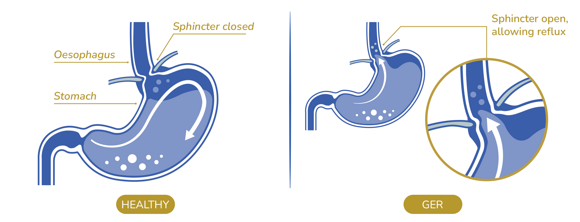Why Do Babies Spit Up and How to Prevent It?
As parents, you must have seen your baby spit up and it often seems like everything they just ate comes right back up. In simple words, spit-up or regurgitation is the movement of stomach contents back into the oesophagus, and sometimes through the mouth and nose. Spitting up is common in infancy and if uncomplicated, is not a sign of illness. Sometimes, infants are known as "happy spitters", because they are not cranky and do not appear to be in pain when spitting up.
Spit - Up mechanism

However, when reflux is associated with other symptoms, or complications such as feeding or swallow difficulties and failure to thrive, if it persists beyond infancy, it is considered a disease and is known as gastro-oesophageal reflux disease (GERD).
Due to multiple reasons, such as immature and loose stomach-intestine joint and liquid meals, this condition is particularly common in early infancy: more than 50% of infants between 3 and 4 months of age experience daily regurgitation.
NUTRIENTS THAT MATTER TO MANAGE SPIT UP
Breastfed babies have overall lower incidents of spit ups and it is considered the best nutrition for babies for the first 6 months according to WHO. You need to consult your doctor if spit ups persists and doctors will recommend continuation of breastfeeding. but if you're baby is using infant formula then the doctor will recommend a formula that contains some of the ingredients below:
PARTIALLY HYDROLIZED WHEY PROTEINS
Hydrolysed whey protein formulas have been shown to reduce the frequency of spit-up. This could be because of the better movement of food from the stomach to the small intestine
PROBIOTICS
(such as L. reuteri DSM 17938)
This probiotic was shown to reduce the frequency of spitting-up, and helping in emptying the stomach easily.
STARCH
Research studies have shown that infant formulas that contain starch to thicken the feeds help decrease the frequency of spit-up

